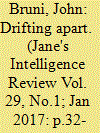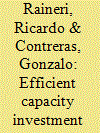| Srl | Item |
| 1 |
ID:
149859


|
|
|
|
|
| Summary/Abstract |
Australia's relationship with China and the United States will be increasingly difficult to balance. In the wake of the US presidential election and subsequent policy uncertainty, and growing assertiveness from Beijing, John Bruni examines the outlook for Canberra.
|
|
|
|
|
|
|
|
|
|
|
|
|
|
|
|
| 2 |
ID:
099233


|
|
|
|
|
| Publication |
2010.
|
| Summary/Abstract |
We develop a model for a power market with the characteristics of the Chilean power supply industry, which is an integrated system with a system operator (SO) with a vast authority to define the dispatch of the system. We evaluate whether a large joint power generator project made up by the two largest power generators is an anti-competitive project. Considering four investment technologies for power generation, namely, hydro, coal, diesel, and an advantageous hydro technology which can only be built in a large scale (HidroAysén) for the joint venture case, we use an oligopolistic Cournot model and a Benevolent Social Planner, both calibrated to the Chilean power industry, in order to assess the efficiency of alternative investment strategies and conditions whether the HidroAysén joint venture project can be barred to be judged as anti-competitive. Results suggest that the joint venture is an efficient investment and there is a pro-competitive behaviour on the part of the two power generators, and that there are benefit to consumers, who should expect non-increasing energy prices as a result of the advantageous hydrotechnology.
|
|
|
|
|
|
|
|
|
|
|
|
|
|
|
|
| 3 |
ID:
073662


|
|
|
|
|
| Publication |
2006.
|
| Summary/Abstract |
Contrary to the increasingly popular image of Russia as an aggressive, imperialist state, the primary drivers in Russia's foreign policy are domestic. They include new economic confidence, new soft power, and remaining security vulnerabilities. In response to these conditions, Russia pursues opportunities for economic growth and stability, and it builds strategic alliances in the near and distant abroad in order to address increasing security threats. The often-used comparison of Russia's foreign policy assertiveness to the Soviet Cold War policy is inaccurate. A better parallel is to Russia's 1890s policy led by Finance Minister Sergei Witte: strong internal economic development through state-driven liberalization, while avoiding foreign policy adventures. The United States should follow a policy of pragmatic substantive engagement, rather than neo-containment, toward Russia.
|
|
|
|
|
|
|
|
|
|
|
|
|
|
|
|